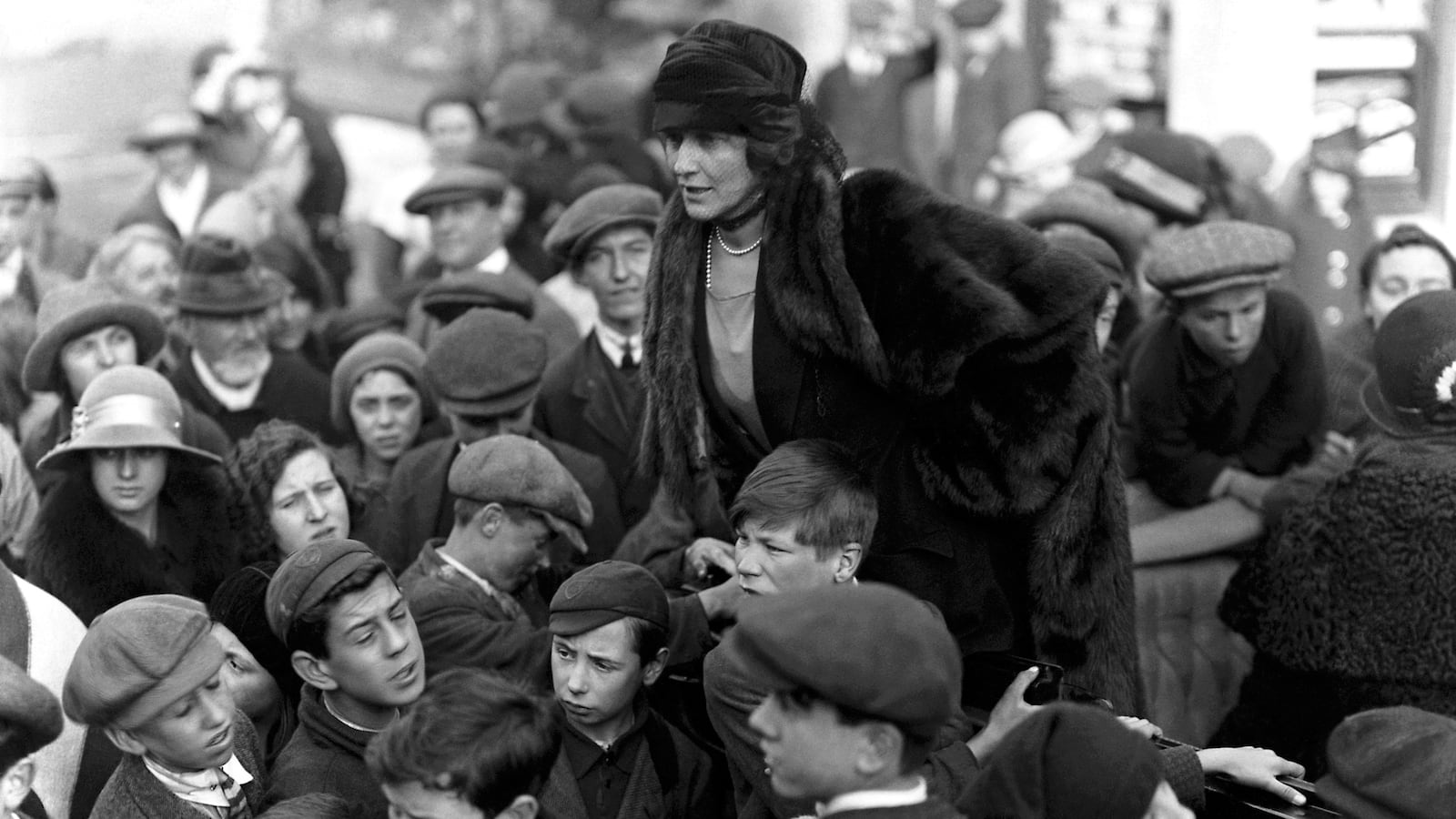One day in the halcyon era just before WWI, fate smiled on a “lady tramp” in the Buckinghamshire countryside. A young mother named Nancy Astor happened to be passing and, paying no heed to the indigent woman’s demurrals, took her home to the Astors’ imposing estate, Cliveden, where she was happily ensconced in a cottage for the rest of her life.
It’s a striking example of Lady Astor’s deeply felt, if haphazardly exercised, noblesse oblige. Against a backdrop of spectacular wealth and privilege—her Virginian father, Chiswell Dabney Langhorne, made a fortune on the railroads, and at the age of 26 she married Waldorf Astor, the England-transplanted scion of the richest family in America—the petite, passionate Southerner was driven by a mania to do her Christian duty, as she saw it. Combined with an addiction to the spotlight and a level of self-confidence that would make today’s celebutantes blush, this do-good desire assured her place in history when, in 1919, she became the first woman to take a seat in the British Parliament, as a Conservative representing Plymouth. She was 40 years old.
As Adrian Fort conveys in his engaging new biography, Nancy: The Story of Lady Astor, Nancy was ideally positioned to break into the historically all-male bastion. The Plymouth seat was previously held by her husband, Waldorf, but, to his eternal chagrin, he inherited a peerage on his father William’s death. As Viscount Astor II, he had no choice but to forego his place in the House of Commons, and so the Tory leadership was persuaded to let Nancy run instead.
Nancy’s lifestyle to date had prepared her well. One of the country’s most prolific society hostesses, since marrying Waldorf she had presided over a ceaseless stream of lavish parties, where political luminaries, diplomats, and royalty socialized with writers, artists, and actors—not simply for fun, Nancy would claim, but always “for special and particular purposes,” such as introducing influential Americans and Englishmen for transatlantic benefit. Suffice it to say that after verbal sparring with the likes of Churchill, as well as making public speeches on her husband’s behalf, the campaign trail held no fear. She whipped up crowds, deflected hecklers with her trademark sass (“Would I like to live on £2 a week? No, but would you work as hard as me if you had what I had?”), and cannily targeted the newly enfranchised female electorate. “I think that women had better put a woman in the House of Commons,” she told them. “Much as I love you, Gentlemen, you have made a terrible muddle of the world without us.”
Yet, as Nancy’s constituents and the wider public soon discovered, this beacon of progress was no permissive free-thinker: she was puritanical, dogmatic, and at times downright hypocritical. Grimly opposed to the nation’s favorite pastime of drinking, she made her maiden speech to Parliament on the immorality of the brewing trade, and declared her hope that Britain would join America in Prohibition. Her horror of drunkenness was rooted in a childhood marred by the alcoholic excesses of her father and brothers, and confirmed when her first husband, Robert Shaw II—the handsome son of a prominent Boston Brahmin family whom she married when she was just 18—turned out to be a heavy drinker. They were divorced after five years, a fact that didn’t deter Nancy from voting against relaxing the divorce laws in 1920.
This short first marriage produced one child, a boy named Bobbie whose very existence was seen as something of a miracle. According to Fort, before her wedding night Nancy had not “comprehended the facts of life,” and following a “brief, unproductive tumult” had extracted herself from the marriage bed and fled home to her parents in a state of shock. They persuaded her to give it another try, but Nancy’s report of waking up to see Bob brandishing a chloroform sponge, evidently determined to assert his conjugal rights, aptly illustrates why their relationship was doomed.

Nancy’s bedroom activity with Waldorf, a fellow teetotaler, was more successful, at least judging by its fecundity. The couple had five children: William (“Bill,” destined to be embroiled in the Profumo scandal in the ’60s), Phyllis (“Wissie”), David, Michael, and John Jacob VII (“Jakie”). Of course, Nancy’s hectic schedule of work, entertaining, and travel was unimpeded by child-rearing responsibilities, which were delegated to the woman she called “the backbone of my home,” the redoubtable Nanny Gibbons. Within this customarily upper-class arrangement, Nancy regarded her children with enormous affection, although they were not spared her acerbic wit. During a Commons debate on birth control, she said, “One of my sons told me recently that I had not taken enough interest in him before he was seven. My reply was that if I had known as much as I do now, I should not have had him at all.”
Waldorf, who suffered periodically from poor health, also sometimes felt sidelined by his wife’s political commitments, which far exceeded her official legislative duties. The linchpin of the “Cliveden Set,” as her powerful circle came to be known, she continued to host elaborate and agenda-led gatherings, such as when trade union leaders and employers were invited for a weekend at Cliveden following the Great Strike of 1926. Waldorf supported Nancy’s causes and was himself very much involved in politics, yet looked forward to enjoying more exclusive attention from her in their old age. “When I married Nancy,” he said in 1944, the year she would retire from Parliament, “I hitched my wagon to a star … In 1919 when she got into the House I found I had hitched my wagon to a sort of V2 rocket.”
Still, their marriage was consistently stable, albeit founded on mutual respect and emotional affinity rather than sexual passion. Nancy never stopped finding sex repellent, which conveniently fit with her Christian conviction that lust was a mortal sin. “Conceived without pleasure, born without pain” was how she referred to procreation, and when her sons were older, she inquired—much to their amusement—why they would bother cheating on their “perfectly good” wives. “It’s not as if it’s so wonderful: sex is just like going to the lavatory.”
Interestingly, Nancy came to accept the bisexuality of her favorite son, her firstborn, Bobbie, perhaps, Fort implies, because she was less threatened by his same-sex relationships than those with women. His lover Frank, she would remark, was “the prettiest of all my children’s girlfriends, the rest of them are overpainted hussies.” Bobbie suffered greatly for his attraction to men: forced to leave the army after being caught in a liaison, he was later arrested for a homosexual act and sent to prison in 1931. A noteworthy detail not mentioned by Fort, who dispenses with Bobbie’s experiences rather cursorily, was that David Astor, Bobbie’s younger half-brother and the longtime editor of The Observer, would become a generous donor to the Homosexual Law Reform Society, whose efforts led to the 1967 decriminalization of homosexuality in England and Wales.
In the end, it was Bobbie’s tragic plight that finished Nancy off. In 1964 he attempted suicide, and she was taken to his bedside. Though her daughter, Wissie, claimed that he’d had a stroke, the sight of poor Bobbie lying unconscious, attached to wires and tubes, was too much. The following weekend Nancy herself suffered a stroke, and died a few weeks later, at the age of 85.
Her legacy is a complex one. Thanks to the inclusion of guests like Hitler’s “ambassador-at-large,” Joachim von Ribbentrop, at her legendary parties, not to mention her support of appeasement in the 1930s—she believed that Nazism would solve the “problems” of communism and the Jews—Lady Astor and her Cliveden Set will forever be associated with a certain strain of aristocratic fascism. Yet as Fort’s biography authoritatively establishes, no single label can be applied to this fearless, misguided, almost unfathomably dynamic whirlwind of a person who, for all her faults, didn’t entirely lack self-awareness: “My vigor, vitality, and cheek repel me,” was one of her famous aphorisms. “I am the kind of woman I would run from.”






